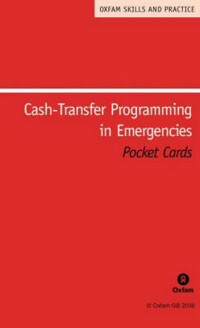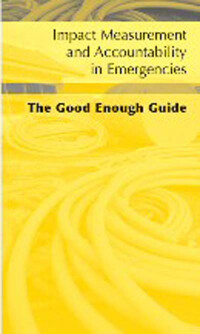Disasters and Emergencies
-
Improving the Safety of Civilians
Improving the Safety of Civilians is an innovative tool which strengthens the capacity of humanitarian field workers to improve civilian safety through humanitarian programmes. Designed for use in difficult and sensitive field situations, the pack draws from extensive experience in real protection c...
-
For a Safer Tomorrow
Since the end of the Cold War, the number of armed conflicts in the world has fallen. But is this trend now about to be reversed? Climate change, poverty and inequality, and the wider availability of weapons all add to the risk of conflicts increasing. In 1949, the Geneva Conventions enshrined peopl...
-
For a Safer Tomorrow (Summary)
Summary of a Safer Tomorrow. Since the end of the Cold War, the number of armed conflicts in the world has fallen. But is this trend now about to be reversed? Climate change, poverty and inequality, and the wider availability of weapons all add to the risk of conflicts increasing. In 1949, the Genev...
-
Building Trust in Diverse Teams
What is trust? Why is it important in emergency-response teams? Humanitarian practitioners identify trust as one of the most important factors in launching timely and effective emergency responses. Building Trust in Diverse Teams can be used throughout the cycle of an emergency response and features...
-
Cash-transfer Programming in Emergencies
In this guide Oxfam staff present the rationale behind cash-transfer programmes. They explain how to assess whether cash is the most appropriate response to any particular emergency. These 16 A6 cards contain key elements from the book. Different types of cash intervention are compared - cash grants...
-
Impact Measurement and Accountability in Emergencies
What difference are we making? How do we know? The Good Enough Guide helps busy field workers to address these questions. It offers a set of basic guidelines on how to be accountable to local people and measure programme impact in emergency situations and contains a variety of tools on needs assessm...
-
Impact Measurement and Accountability in Emergencies (Arabic)
What difference are we making? How do we know? The Good Enough Guide helps busy field workers to address these questions. It offers a set of basic guidelines on how to be accountable to local people and measure programme impact in emergency situations and contains a variety of tools on needs assessm...
-
Protection
This guide gives essential advice and insights to humanitarian practitioners who are involved in providing safety and protecting vulnerable people in war and disaster. It provides a framework for responsibility and action, which helps clarify conceptual issues and helps humanitarian field workers po...
-
Aiding Peace?
While NGOs’ role in advocacy and agendasetting is fairly widely accepted, their peacebuilding activities are more controversial and have come under increasing scrutiny—not least from the NGOs themselves. As the number of NGOs, and their role in conflict situations, has grown exponentially, they have...
-
Cash-Transfer Programming in Emergencies
In emergencies distributing cash can often meet peoples immediate needs more quickly and appropriately than the direct distribution of commodities. Cash gives people choices and thereby preserves their dignity. Commodity distribution often poses logistical problems and, in the case of food aid, it m...










